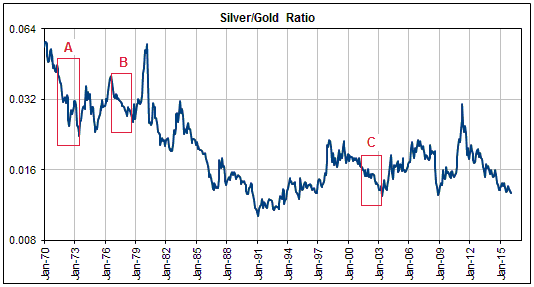This post is a modified excerpt from a recent TSI report.
A popular view is that silver outperforms gold during bull markets for these metals, but that’s only true if the entire bull market is considered. That is, it’s true that silver has in the past achieved a greater percentage gain than gold from bull-market start to bull-market end. However, since the birth of the current monetary system the early stages of gold-silver bull markets have always been characterised by relative WEAKNESS in silver.
To check that this is, indeed, the case, refer to the following long-term chart of the silver/gold ratio. The boxes labeled A, B and C on this chart indicate the first two years of the cyclical precious-metals bull markets of 1971-1974, 1976-1980 and 2001-2011, respectively. Clearly, silver underperformed gold during the first two years of each of the last three cyclical precious-metals bull markets that occurred within secular bull markets. Therefore, assuming that a gold bull market has either just begun or will soon begin, on what basis should we expect to see persistent and substantial strength in silver relative to gold over the coming 1-2 years?

The one plausible answer to the above question is that the scope for additional weakness in silver relative to gold has been greatly diminished by the extent to which silver has already fallen relative to gold. In particular, in gold terms silver is now almost as cheap as it was in early-2003 (2 years into the most recent previous bull market), which means that it is close to its lowest price of the past 20 years. Silver is also now vastly cheaper relative to gold than it was when cyclical bull markets were getting underway in 1971 and 1976.
In summary, history tells us to expect continuing weakness in silver relative to gold during the first two years of the next precious-metals bull market (which has possibly just begun), whereas the unusually-depressed current level of the silver/gold ratio suggests that the historical precedents might not apply this time around.
I don’t have a strong preference either way.
 Print This Post
Print This Post
